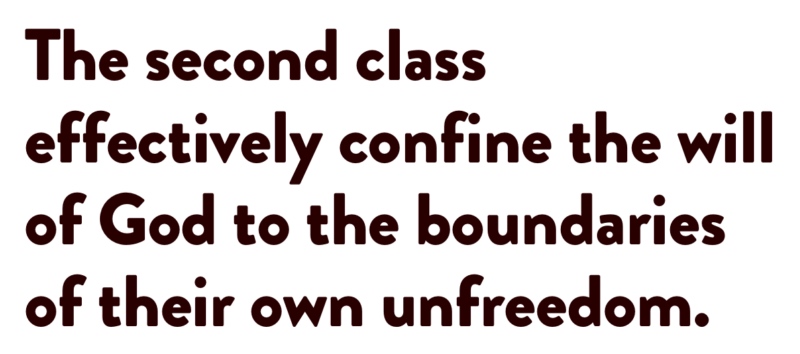 St Ignatius defines the term “spiritual exercises” as “every way of preparing and disposing the soul to rid itself of all inordinate attachments, and, after their removal, of seeking and finding the will of God in the disposition of our life for the salvation of our soul.” In other words, our spiritual life and its practices have the purpose in freeing ourselves from the things that hold us back from a full union with God.
St Ignatius defines the term “spiritual exercises” as “every way of preparing and disposing the soul to rid itself of all inordinate attachments, and, after their removal, of seeking and finding the will of God in the disposition of our life for the salvation of our soul.” In other words, our spiritual life and its practices have the purpose in freeing ourselves from the things that hold us back from a full union with God.
Yet many of us well-meaning people approach our spiritual life trying to conform God to our attachments. We often speak about an inner freedom that is required for our spiritual journey – things like letting go of a need for control or superficial desires, letting go of certain expectations, acting according to our values, or finding an inner sense of peace and trust. But there are many ways in which we require external freedom.
External Freedom
It’s worth noting that there are many circumstances in our lives that may inhibit us from making a certain decisions. Ignatius gives the examples of priesthood and marriage as things, that once entered into, are unchangeable. So while I may have longings for things I used to have in religious life, I cannot unmarry my wife to return to that, so that kind of decision is off the table. There are other things of course that can hinder a decision. For some, moving across the country for a new job may not be financially feasible. My partner’s career path may also be a reason I can’t make a certain decision right now. I may not be able to move to another part of the world because of certain immigration laws in that country. My health or my age may prevent me from doing certain things. All this is to say that any discernment process requires us to gauge how externally free we are – and that some unfreedoms our not our own making.
However, there are many things in our life that we do have the ability to free ourselves from. This means that I must examine the things in my life and ask myself, “How are these things helping me grow in love with God and neighbour?” If something is not helping me in that then, Ignatius says, I ought to rid myself of it. The basic question of Ignatian spirituality is What are the gifts in my life and how am I responding to them? And I may begin treating some of these things not as gifts but as possessions.
The Means or the End?
 Ignatius offers a meditation on external freedom in his Spiritual Exercises called the Three Classes of Persons. He invites us to imagine three people receiving a very large sum of money. This money has become a distraction in their life with God. These three people wish to grow into a deep union with God, but they have three different responses to this gift. The first “class” of person does not want this attachment looming over them but they never do anything about it; they’re all talk and no action. The second person uses a bargaining tactic, wanting things on their own terms. At the end of things, they end up finding a way to justify keeping most of the money. The third class of person is truly indifferent. For them, it’s not about keeping it or not. They simply want what God wants and are willing to enter into a discernment to figure that out.
Ignatius offers a meditation on external freedom in his Spiritual Exercises called the Three Classes of Persons. He invites us to imagine three people receiving a very large sum of money. This money has become a distraction in their life with God. These three people wish to grow into a deep union with God, but they have three different responses to this gift. The first “class” of person does not want this attachment looming over them but they never do anything about it; they’re all talk and no action. The second person uses a bargaining tactic, wanting things on their own terms. At the end of things, they end up finding a way to justify keeping most of the money. The third class of person is truly indifferent. For them, it’s not about keeping it or not. They simply want what God wants and are willing to enter into a discernment to figure that out.
I think many of us live as this “second class” of person who makes a choice on their own terms and then wants God to conform to that, rather than the other way around. Ignatius gives marriage as an example:
I must not subject and fit the end to the means, but the means to the end. Many first choose marriage, which is a means, and secondarily the service of God our Lord in marriage, though the service of God is the end. (SpEx, 169)
In other words, marriage is primarily for the purpose of serving God. It is the means to the end.
 Michael Ivens, SJ says, “The second class effectively confine the will of God to the boundaries of their own unfreedom (as opposed to expanding the boundaries of freedom in order to discern the will of God).” It’s worth asking ourselves what our unfreedoms are in life. What am I clinging to? Ignatius names riches, honour, and pride as three big ones. Do I try and justify my riches or my status, forcing God into it? In his Rules for the Discernment of Spirits, Ignatius says that the evil spirit also can cause us to cling to genuinely good things. I can get attached to the idea of giving away money or to a good work, and these things can puff up my ego, slowly drawing me away from a humble freedom in God. At its worst, I take on a saviour complex and assume God’s just conforming to my agenda.
Michael Ivens, SJ says, “The second class effectively confine the will of God to the boundaries of their own unfreedom (as opposed to expanding the boundaries of freedom in order to discern the will of God).” It’s worth asking ourselves what our unfreedoms are in life. What am I clinging to? Ignatius names riches, honour, and pride as three big ones. Do I try and justify my riches or my status, forcing God into it? In his Rules for the Discernment of Spirits, Ignatius says that the evil spirit also can cause us to cling to genuinely good things. I can get attached to the idea of giving away money or to a good work, and these things can puff up my ego, slowly drawing me away from a humble freedom in God. At its worst, I take on a saviour complex and assume God’s just conforming to my agenda.
Ignatius says,
People like this do not go straight to God; they want God to come straight to their own disordered attachments. Consequently they make a means of the end, and an end of the means, and so what they ought to put first, they put last. My objective should be in the first place to desire to serve God, which is the end… (SpEx, 169)
So what begins as a good work founded in freedom becomes the end in itself, becoming an unfreedom in my life with God. My inner freedom is very much connected to what I am externally free from, whether it is money, a job, or some other thing. In fact, the line between an “internal” and an “external” freedom is blurry. Our inner freedoms affect our outer responses, and our external realities prompt our inner responses.
Consider the rich young man of the gospels who comes to Jesus and essentially asks how he can be in a deeper union with God. When he tells Jesus that he already follows the commandments like a good Jew, Jesus tells him to sell all his possessions and follow him. What does he do? He goes away sad because “he had many possessions.” He was clinging to those possessions. He wanted God on his own terms, to conform to his agenda, his attachments. We ought to gauge our freedom: Do we love God or God’s gifts? Am I sticking to my own agenda and expecting God to conform to it? Or am I open expanding the boundaries of my freedom, allowing God to have a part in my journey?
Related posts:
Listen to the podcast version of this post…









Thank you for your post! I found this sentence particularly helpful: “This means that I must examine the things in my life and ask myself, “How are these things helping me grow in love with God and neighbour?””
Keep up the good efforts!
Cheryl Ross
Religious teachings basically limit the human’s wild instincts.